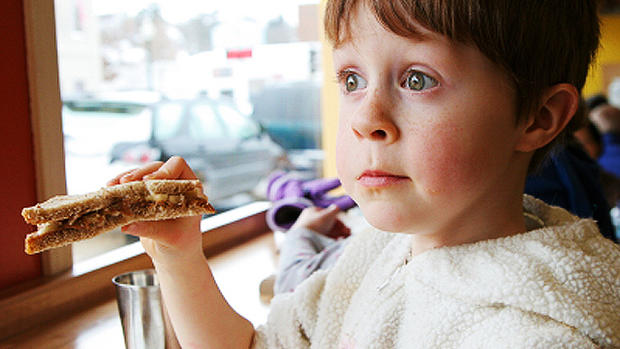Bullying affects one in three kids with food allergies, study finds
As if having food allergies isn't hard enough on a child, new research finds at least one-third of kids with food allergies said they are targets of bullying.
Researchers from Mount Sinai School of Medicine in New York City surveyed about 250 children with food allergies and their parents and found 31.5 percent said they are subjected to taunts and threats that frequently involve the allergy-inducing food.
Bullying not only caused higher levels of stress for these children and their parents, but could potentially risk a child's life if they have a history of severe allergic reactions to the food they're being taunted with.
"Our results should raise awareness for parents, school personnel, and physicians to proactively identify and address bullying in this population," study author Dr. Scott H. Sicherer, chief of the pediatric allergy division at Mount Sinai, said in a statement.
Children who reported bullying and their parents were more likely to report a lower quality of life on the survey. About half of surveyed parents said they were "aware" of bullying, and children of parents who said they were aware were more likely to report less stress and a higher quality of life than parents who were unaware of a problem.
The research was published Dec. 24 in Pediatrics.
"Parents and pediatricians should routinely ask children with food allergy about bullying," said study author Dr. Eyal Shemesh, chief of the division of behavioral and developmental health in the department of pediatrics at The Mount Sinai Medical Center. "Finding out about the child's experience might allow targeted interventions, and would be expected to reduce additional stress and improve quality of life for these children trying to manage their food allergies."
Bullying at school or on the Internet -- known as cyberbullying -- has made headlines in recent years as stories emerge of suicides and the severe emotional toll the mean-spirited teasing can have on children.
- Survey finds 63% of children with autism bullied
- Eleven percent of infants' allergic reactions to food are intentionally caused
- Household income tied to risk for peanut allergies
"There has been a shift and people are more and more recognizing that bullying has real consequences, it's not just something to be making jokes about," Dr. Mark Schuster, chief of general pediatrics at Boston Children's Hospital. who wrote am accompanying commentary with the new study, told Reuters.
Schuster also told HealthDay that parents themselves could be more understanding of their classmates' food allergies, because they may unknowingly be encouraging bullying. He noted some parents may "roll their eyes" or complain they can't send cookies and other foods to schools because classmates have food allergies, and kids can pick up on this negativity.
Approximately 8 percent of U.S. children have food allergies, according to estimates from the American Academy of Allergy, Asthma and Immunology (ACAAI). Nearly 40 percent of these children have a history of severe allergic reactions like anaphylaxis, which can be life-threatening.
The ACAAI has more information on food allergies.

